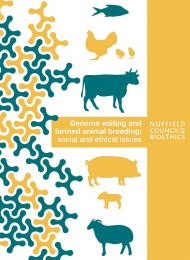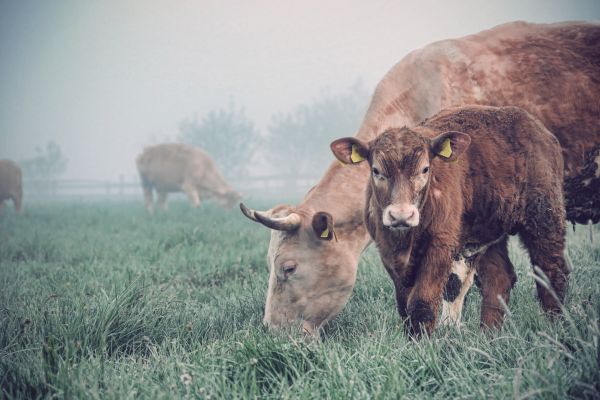Genome editing and farmed animal breeding: social and ethical issues
Report
Published 01/12/2021

Overview and key findings
The background to this report on genome editing and farmed animal breeding begins by noting that there are currently several major challenges within our global food and farming systems, including:
- Environmental harms caused by intensive agriculture systems.
- Health and welfare concerns for the animals that are bred to provide us with meat, eggs and dairy produce.
- Threats to human health posed by modern diets and diseases transmitted by animals in agriculture.
- Changes in demand due to demographic shifts like increased urbanisation and increasing levels of meat consumption in many regions of the world.
Our report concludes that our global food and farming systems are morally indefensible and unsustainable in their present form. The ways in which we produce and consume food will have to adapt in order to address the challenges above and to provide a secure, sustainable and ethical supply of nutritious food for our growing global population.
Genome editing is the precise and targeted alteration of a DNA sequence in a living cell. Genome editing techniques offer the potential to target and alter genes in specific ways. Breeding technologies such as genome editing may have a significant role to play in food and farming systems of the future. Applications of genome editing in farmed animal breeding are aimed at producing animals with specific traits that might be difficult, or even impossible, to achieve using conventional selective breeding approaches.
New biotechnologies like genome editing offer the possibility of producing animals with traits that may, in the right circumstances, lead to improvements in animal health and welfare, for example, by increasing animals’ resistance to prevalent diseases that have devastated many farming sectors in recent years. It may also help to address environmental sustainability.
However, there is also a potential for genome editing technologies to be applied without considering animals’ basic interests, in a way that may compound some of the problems with historical selective breeding. An example of this would be introducing changes that enable animals to endure poorer living conditions such as overcrowding, with fewer adverse health impacts. Care must therefore be taken to ensure that the introduction of new technologies such as genome editing do not contribute to an acceleration of unethical breeding practices.
A rapid public dialogue commissioned to inform this inquiry revealed that the public generally seem more concerned about how and why new breeding technologies will be used than the nature and safety of the techniques – i.e. it is not what is done, but why it is done that matters most to them. Several people recognised the need for strong governance to ensure that any introduction of novel technologies into farmed animal breeding is aligned with people’s and animals’ basic interests e.g. promoting higher standards of animal welfare.
Everyone has a role to play in adapting to more sustainable systems of farming and food production, but this cannot be achieved without a governance system that promotes and encourages these changes.
We propose five principles to guide the development of food and farming systems and the introduction of new breeding technologies for farmed animals.
We then make a series of recommendations including to the UK Government, animal breeders and developers, major food retailers, research funders and others involved in shaping food and farming industries both in the UK and internationally.

Share